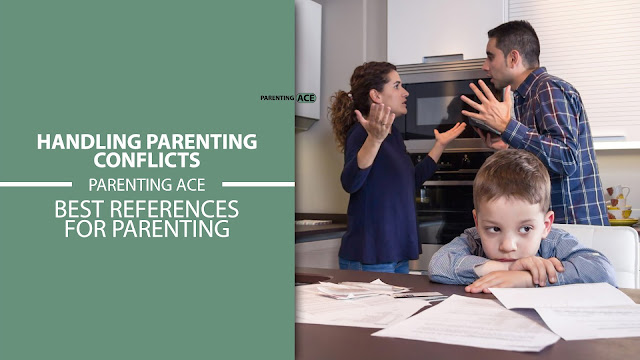Addressing Conflicts: Navigating Challenges in Parenting
In the intricate tapestry of parenting, conflicts often emerge as inevitable threads, weaving their way through the fabric of family life. From disagreements over rules to tensions surrounding independence, navigating these conflicts is not just a challenge but a critical aspect of fostering healthy parent-child relationships. In this blog post, we delve into the complexities of addressing conflicts in parenting, exploring the impact of unresolved issues on family dynamics and the emotional well-being of children. Join us as we unravel effective strategies for managing conflicts with empathy, communication, and collaboration, ultimately fostering stronger bonds and a more harmonious family environment.
 |
| Handling Parenting Conflicts |
Conflict is an inevitable part of parenting. Whether it's a disagreement over rules, clashes of personalities, or struggles for independence, conflicts can arise at any stage of a child's development. How parents address and resolve these conflicts plays a crucial role in shaping the dynamics of the parent-child relationship and influencing the child's emotional well-being and behavioral outcomes.
Understanding the Nature of Conflicts
Conflicts in parenting often stem from differences in perspectives, values, and expectations between parents and children. These conflicts can manifest in various forms, such as power struggles, communication breakdowns, or resistance to authority. Understanding the underlying causes of conflicts is essential for effective resolution and fostering positive relationships within the family.
The Impact of Unresolved Conflicts
Unresolved conflicts can have detrimental effects on both parents and children. For parents, ongoing conflicts can lead to stress, frustration, and feelings of inadequacy. It can strain marital relationships and contribute to a negative family environment. For children, witnessing or experiencing conflict within the family can result in emotional distress, low self-esteem, and behavioral problems. Long-term exposure to unresolved conflicts may even impact their social interactions and future relationships.
Effective Strategies for Addressing Conflicts
- Open Communication: Encourage open and honest communication within the family. Provide a safe space for children to express their thoughts and feelings without fear of judgment. Listen actively to their concerns and perspectives, and validate their emotions.
- Empathy and Understanding: Practice empathy by putting yourself in your child's shoes and understanding their point of view. Acknowledge their feelings and validate their experiences, even if you disagree with their behavior. This helps build trust and strengthens the parent-child bond.
- Setting Clear Boundaries: Establish clear and consistent boundaries regarding behavior, responsibilities, and consequences. Communicate these boundaries effectively and ensure that they are reasonable and age-appropriate. Consistently enforce consequences for violating boundaries while providing opportunities for learning and growth.
- Collaborative Problem-Solving: Involve children in the problem-solving process and encourage them to contribute to finding solutions. Collaboratively brainstorming and negotiating compromises empower children to take ownership of their actions and develop critical thinking skills.
- Seeking Support: Don't hesitate to seek support from parenting resources, counselors, or support groups when faced with challenging conflicts. Professional guidance can provide valuable insights and strategies for resolving conflicts in a healthy and constructive manner.
Addressing conflicts in parenting requires patience, empathy, and effective communication. By understanding the nature of conflicts, recognizing their impact, and implementing strategies for resolution, parents can nurture positive relationships with their children and create a harmonious family environment. Ultimately, addressing conflicts in parenting is not just about resolving disagreements; it's about fostering mutual respect, understanding, and love within the family, thus laying the foundation for healthy emotional development and lifelong relationships.



Comments
Post a Comment